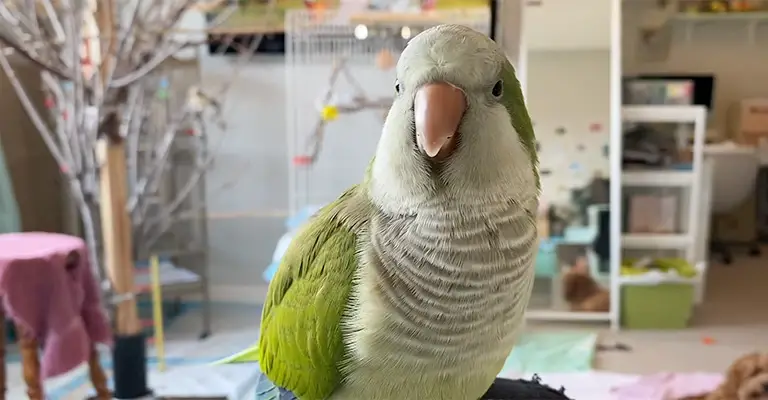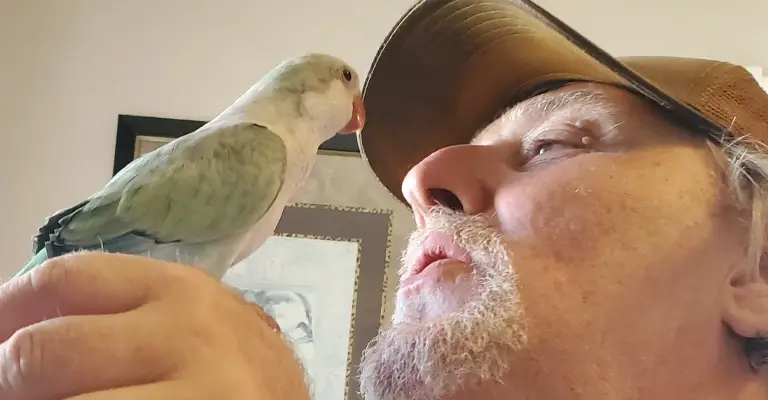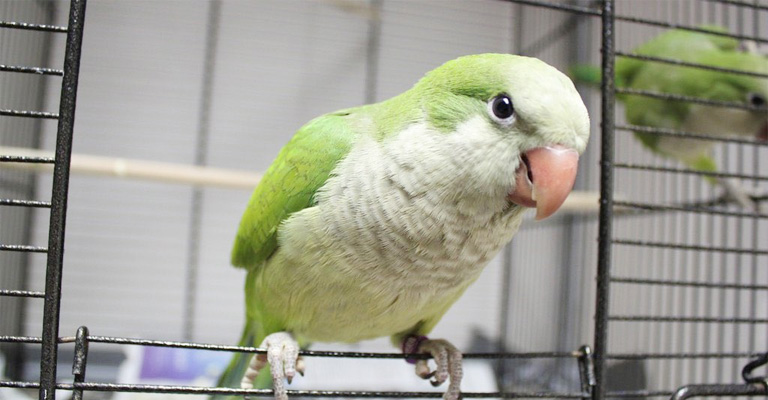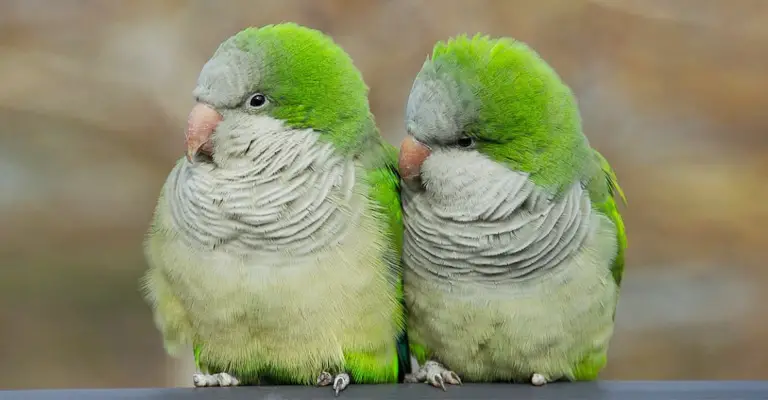Quaker Parrots, also known as Monk Parakeets, have long fascinated bird enthusiasts with their remarkable ability to mimic sounds and speech.
Their charming personalities and vibrant plumage make them popular avian companions. But can Quaker Parrots talk?
This blog post explores the intriguing world of Quaker Parrot vocalizations, shedding light on their talking abilities, the training process, and what to expect from these delightful birds.
These intelligent and social creatures have a lot to offer, whether they become proficient talkers or not.
The nuances of their vocal talents can help potential and current Quaker Parrot owners provide the best care and engagement for their feathered friends.
So, let’s dive into the fascinating world of Quaker Parrot speech and discover the secrets behind their chatty nature. So, stay focused.

Can Quaker Parrots Talk?
Yes, Quaker Parrots, also known as Monk Parakeets, are known for their ability to mimic and talk. They are among the parrot species renowned for their impressive vocal talents.
While they may not be as proficient as some other parrot species like African Greys or Amazons, Quaker Parrots can develop a vocabulary of words and phrases with proper training and socialization.
Their talking ability varies from bird to bird, with some Quakers being more talkative than others. It’s essential to interact with them regularly, provide a stimulating environment, and use positive reinforcement to encourage their talking skills.
With patience and consistent training, many Quaker Parrots can learn to mimic sounds and words, adding an entertaining and interactive element to their charming personalities.
Can All Quaker Parrots Talk?
Not all Quaker Parrots can talk, as their ability to mimic speech varies from bird to bird, just like in humans, where some individuals are more skilled at learning languages than others.
Factors influencing a Quaker Parrot’s talking ability include genetics, early socialization, and the amount of interaction and training they receive.
While some Quaker Parrots might become proficient talkers with the right training and environment, others may only mimic a few sounds or not speak at all. It’s important to remember that talking is just one aspect of their intelligence and personality.
Quaker Parrots can be delightful and entertaining pets even if they don’t develop extensive vocabularies. Each bird is unique, and their capacity for talking should not be the sole criterion for evaluating its worth as a companion.
How to Teach a Quaker Parrot to Talk?

Teaching a Quaker Parrot to talk requires patience, consistency, and positive reinforcement. Here are some steps to help you get started:
Socialize Your Parrot
Begin by spending quality time with your Quaker Parrot daily. Talk to them and interact with them to build a strong bond.
Choose the Right Environment
Create a quiet and comfortable environment with minimal distractions when you’re trying to teach your parrot to talk. This will help them focus on learning.
Start with Simple Words
Begin with short, simple words or phrases. Choose words that are relevant to your parrot’s routine, such as their name, basic commands like “hello” or “goodbye,” or common words associated with their daily activities.
Repetition is Key
Repeat the chosen words or phrases consistently. Say them clearly and distinctly so your parrot can mimic the sounds accurately.
Use Positive Reinforcement
Reward your parrot with treats, praise, or affection when they make an effort to mimic or say words. Positive reinforcement will encourage them to continue trying.
Be Patient
Not all parrots will learn at the same pace, and it may take some time before you see progress. Be patient and persistent.
Consistent Training Sessions
Set aside dedicated training sessions each day, but keep them short and enjoyable for your parrot. Avoid overloading them with too much training at once.
Mimicry and Imitation
Quaker Parrots are excellent mimics, so use this to your advantage. If your parrot starts to mimic sounds or words on their own, encourage and reinforce their efforts.
Be a Good Role Model
Speak clearly and enunciate words when interacting with your parrot. They will learn by imitating your speech.
Record Your Voice
Playing back recorded phrases or words can sometimes help your parrot learn. Hearing their own voice or your voice through a recording may encourage them to mimic more.
Remember that not all Quaker Parrots will talk, and some may have limited vocabulary despite your efforts.
Other Vocalizations of Quaker Parrots

Quaker Parrots, also known as Monk Parakeets, are known for their vocal abilities, and they produce a variety of vocalizations besides talking. Here are some common vocalizations you may hear from Quaker Parrots:
Chatter
Quakers are quite chatty birds and will often chatter or babble when they are content or excited. This can sound like a continuous stream of chirps and squawks.
Squawking
When Quaker Parrots are alarmed or feel threatened, they may emit loud squawking sounds. This is their way of alerting their flock or signaling danger.
Whistling
Quaker Parrots are capable of producing whistling sounds, and they may learn various tunes or melodies, especially if they hear them frequently from their human companions.
Mimicking Sounds
In addition to human speech, Quaker Parrots can mimic a wide range of sounds from their environment. This might include phone ringtones, doorbells, or even the sounds of other animals.
Screeching
When Quakers are excited or want attention, they may let out high-pitched screeches. This can be their way of expressing enthusiasm or wanting to engage in play.
Purring
Quaker Parrots can make purring or cooing sounds when they are content, relaxed, or feeling affectionate. It’s a sign of their comfort and happiness.
Singing
Some Quaker Parrots are talented singers and may produce melodious tunes. These songs can vary from bird to bird, and they often sing when they are in a good mood.
Clicking
Quakers may make clicking sounds as part of their communication, often during interactions with their flock or during courtship.
Laughing
Quaker Parrots can produce sounds that resemble laughter or chuckling. These playful sounds often occur during play or moments of excitement.
It’s important to note that the vocalizations of Quaker Parrots can vary from bird to bird. While some may be more vocal and expressive, others may be quieter.
Quaker Parrots as Companion Animals

Quaker Parrots, also known as Monk Parakeets, can make wonderful companion animals for the right owner. Here are some key points to consider if you’re thinking about having a Quaker Parrot as a pet:
Social and Intelligent
Quaker Parrots are highly social and intelligent birds. They thrive on interaction and mental stimulation. They can be very engaging and form strong bonds with their human caregivers.
Playful Nature
Quakers are playful by nature and enjoy toys, puzzles, and activities that challenge their intellect. Providing them with a variety of toys and opportunities for play is essential for their well-being.
Vocal and Talkative
Quaker Parrots are known for their vocal abilities. While not all Quakers talk, many can mimic sounds and words. If you’re looking for a talkative companion, they can be a good choice.
Lifespan
Quaker Parrots have a relatively long lifespan of 15 to 20 years or more with proper care. Be prepared for a long-term commitment when considering them as pets.
Socialization
Early socialization is crucial for Quaker Parrots to become well-adjusted pets. Spend time with your birds, talk to them, and handle them gently to build trust and a strong bond.
Diet and Nutrition
Proper nutrition is vital for their health. A balanced diet includes fresh fruits, vegetables, high-quality pellets, and a limited amount of seeds. Consult with a veterinarian or avian specialist for dietary recommendations.
Cage and Environment
Provide a spacious cage with plenty of room for movement. Quaker Parrots are active birds and need space to fly and exercise. Fill the cage with perches, toys, and mentally stimulating activities.
Training
Quaker Parrots can be trained to perform tricks and follow commands. Positive reinforcement training methods work well with them.
Noise Level
Be prepared for some noise. While not as loud as larger parrot species, Quaker Parrots can still be noisy, especially when excited or during their social interactions.
Legal Considerations
Check local regulations and laws regarding pet ownership of Quaker Parrots, as they may be considered invasive species in some areas.
Healthcare
Regular veterinary check-ups are essential to monitor your bird’s health. Be aware that Quaker Parrots are prone to certain health issues like obesity and respiratory problems.
Quaker Parrots can make loving and engaging companions for those who are willing to invest time and effort into their care and socialization.
Tips to Train Your Quake Parrot to Talk
Training your Quaker Parrot to talk can be a rewarding experience. Here are some tips to help you teach your Quaker Parrot to talk:
Start Early
The earlier you begin training your Quaker Parrot, the more likely they are to pick up speech. Younger birds tend to be more receptive to learning.
Use Repetition
Repeat words or phrases consistently. Quakers learn through repetition, so practice the same words or phrases during training sessions.
Choose Simple Words
Start with straightforward, short words or phrases. Names, basic commands, or common greetings like “hello” and “goodbye” are good choices.
Clear Pronunciation
Enunciate words clearly and speak at a moderate pace. Your Quaker Parrot needs to hear the words distinctly to mimic them accurately.
Be Patient
Some Quaker Parrots take longer to learn than others. Be patient and persistent, and avoid getting frustrated if progress is slow.
Positive Reinforcement
Reward your bird with treats, praise, or affection when they make an effort to mimic words correctly. Positive reinforcement encourages them to continue trying.
Regular Practice
Set aside dedicated training sessions each day, but keep them short and enjoyable. Overtraining can lead to frustration for both you and your bird.
Interactive Play
Incorporate talking into interactive playtime. For example, say a word or phrase when offering a toy or treat to associate the word with a positive experience.
Imitate Sounds
Quaker Parrots are great mimics, so if your bird starts making sounds, imitate them back. This encourages them to continue the conversation.
Avoid Negative Reinforcement
Avoid scolding or punishing your Quaker Parrot if they don’t talk or make mistakes. This can discourage them and hinder the learning process.
Be Consistent
Maintain a consistent training routine and use the same words or phrases consistently. This helps reinforce what your bird has learned.
Use Audio Recordings
Playing back recorded words or phrases can sometimes help birds learn. Hearing the same words from a recording can encourage mimicry.
Keep Training Fun
Make training sessions enjoyable for your Quaker Parrot. Use toys, treats, and positive attention to keep them engaged and motivated.
Model Talking
Quaker Parrots learn by imitation, so talking to your bird regularly can help them learn words and phrases from you.
Respect Their Limits
Not all Quaker Parrots will become proficient talkers, and some may have a limited vocabulary. Respect your bird’s individual abilities and focus on what they can comfortably learn.
Remember that not all Quaker Parrots will talk, and their capacity to mimic speech can vary. Enjoy the process of bonding and communicating with your bird, regardless of the extent of their talking abilities.
FAQs
No, not all Quaker Parrots can talk. Their ability to mimic speech varies among individuals, and some may not talk at all. It depends on factors like genetics, socialization, and training.
Quaker Parrots can start mimicking sounds and words at a young age, usually around 3 to 4 months old. However, consistent training and interaction are crucial for developing their talking skills.
To teach your Quaker Parrot to talk, start with simple words or phrases, use repetition, and offer positive reinforcement like treats and praise. Consistent training sessions, patience, and a stimulating environment will help facilitate their learning.
Begin with basic words such as their name, common greetings like “hello” and “goodbye,” and simple commands. Choose words relevant to your parrot’s daily routine to make learning more natural for them.
Yes, Quaker Parrots are excellent mimics and can learn to replicate a wide range of sounds from their environment, including phone ringtones, laughter, whistling, and even the sounds of other animals. Their ability to mimic extends beyond just human speech.
Wrapping Up
The question, “Can Quaker Parrots talk?” is met with a resounding “yes,” but it comes with a caveat. While not all Quaker Parrots will become accomplished talkers, their potential for mimicking sounds and words adds an engaging dimension to their already captivating personalities.
Patience, consistent training, and positive reinforcement can help unlock their talking abilities, enhancing the bond between you and your avian companion.
Regardless of their speech capabilities, Quaker Parrots bring joy and charm to any household, making them wonderful additions to the world of pet birds. So, whether they speak fluently or offer an array of other delightful vocalizations, these colorful birds are sure to brighten your life. Thank you.